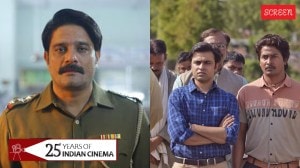Read My Lips
The ignored and necessary art of movie subtitling
The ignored and necessary art of movie subtitling
I had asked you for love but you gave me a blemish. Fate and circumstance forces me to show up in this colour. Youve encased my soul in your dimple. Or even,Oh exploded cucumber I will extract your shyness.
Anyone whos watched an Indian movie with English subtitles knows the weird or wooden touch they bring to an otherwise dignified film. They destroy any wordplay or poetry,and they reduce serious characters into these strange babblers. For more,I recommend Paagal Subtitle,a crowdsourced project devoted to the magnificent errors of Bollywood movie subtitling (itself inspired by the even funnier Hong Kong subtitles meme: Beware! Your bones are going to be disconnected).
Though theyve been around since talkies began,subtitles still get little respect. They are among the lowest rungs of translation,barely a step up from the news ticker. The subtitler is a spectral presence,who usually gets only passing mention in the credits. But getting captioning right can be a demanding and subtle balancing act Woody Allen subtitler Henri Behar once said that subtitling was like playing 3-D Scrabble in two languages.
When done with care,it is also an attempt to render the crackle and idiomatic punch of spoken lines,and render one culture in terms of another (Fred Astaire in The Band Wagon saying,I declare my independence,its the new me,1776 becomes,in the French version Je déclare mon indépendance,le nouveau moi,1789.) But unlike translating writing from one language into another,film subtitling is just a sorry necessity. Movies are all about the glory and supremacy of the moving image,and the white crawl at the bottom is a distraction. Subtitles divide your attention. You see and sense whats going on,but youre still forced to rely on an inept interpreter.
For directors,subtitles are a compromise you agree to let running intrude into your frames,in return for taking the film into new territories. Even a film-maker as wordy and essayistic as Jean-Luc Godard had an uneasy relationship with subtitles. Watching many of his films is a literary joy,and they are a necessary part of his worldwide fame but he clearly does not relish the captioner’s intervention. A movie like Contempt is a goulash of many languages,with an Italian interpreter dealing with French,German and English,during the course of a film shoot. His recent Film Socialisme refused to play well with others in the non-Francophone world. Only one in a few words was translated into English,leaving those didn’t understand French baffled and provoked. Don’t translate,learn languages, was Godards insouciant suggestion.
Of course,subtitles have also become a convention,begging to be subverted and toyed with. Like Annie Hall,where Woody Allen and Diane Keaton make preliminiary polite conversation,as subtitles sneakily reveal their nervous attempts to impress each other (What a great looking girl… Don’t blow it). In Love,Actually,Jamie (Colin Firth) and his Portuguese crush stumble their way through a marriage proposal,and their romance is revealed through clunky captions that mock the frustrations of reaching across languages. (Jamie: (in Portuguese) Beautiful Aurelia,I have come here with a view to asking you if you will marriage me. Aurelia: Thank you. That will be nice. Yes is being my answer. Easy question.)
But why are subtitles such unloved intermediaries? Watching a Hindi or Malayalam movie with people who can only read the inadequate words while I try and explain the nuances has been a cringe-making exercise,but watching foreign films in exactly the same way seems so natural. If the subtitling is serviceable (unlike a Tarkovsky movie I watched,where the white caption letters were effaced by the snowy settings,making the movie impossible to follow) you barely notice the movie’s foreignness. And equally,you rarely realise that youve watched a stripped-down version of the movie,that many of the flourishes in the script have escaped you. Watching a foreign film is halfway between a book and a movie,and it offers its own peculiar rewards.
An essay by the American writer Ruby Rich,in a wonderful anthology called Subtitles: on the Foreignness of Film,discusses the awkward but beautiful gesture that subtitles represent the translation of other people’s experience,the entering into other subjectivities. As Rich writes: It’s harder to bomb a country when youve seen their cities in films that youve loved. Its hard to pretend whole cultures neednt exist when you’ve entered the space of their own yearning and fear and hope. Subtitles,Id like to think,are a token of peace.
amulya.gopalakrishnanexpressindia.com


- 01
- 02
- 03
- 04
- 05





























